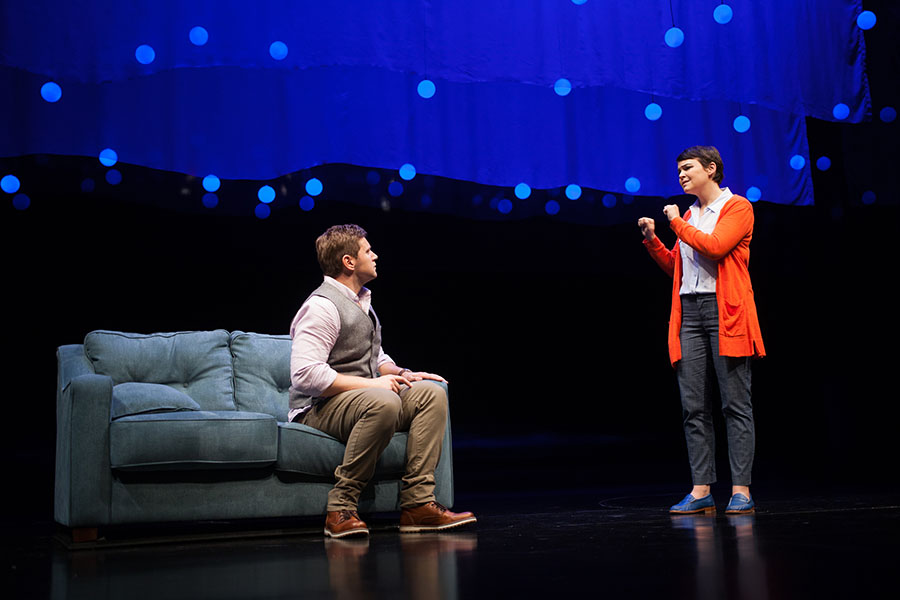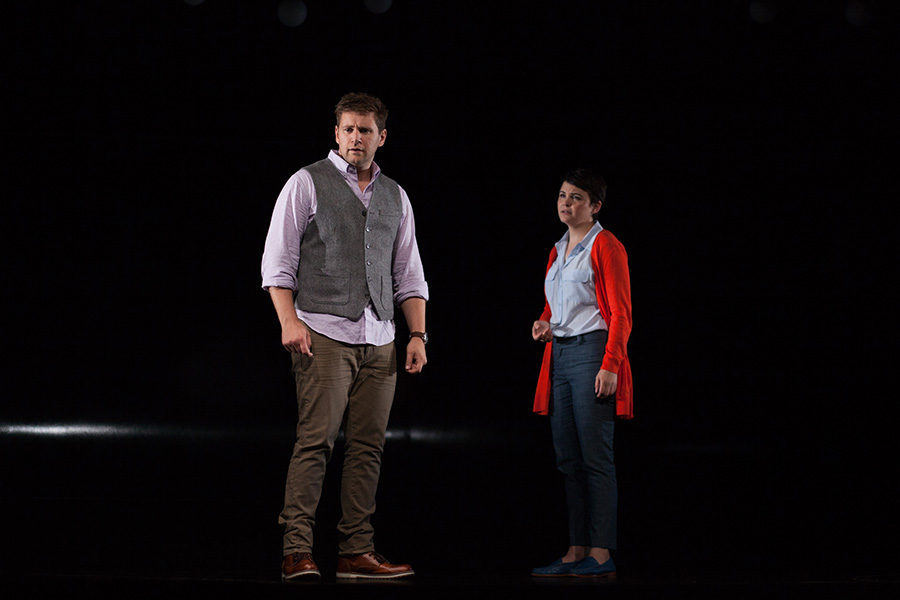When Ginnifer Goodwin was meeting with director Giovanna Sardelli about potentially starring in Nick Payne’s Constellations at the Geffen Playhouse, she said, “I’m okay if I don’t get this part because I know that in some universe, I will.”
“Well, I’m glad it’s this universe!” her co-star Allen Leech, of “Downton Abbey” fame, chimes in.
“I’m glad it’s this universe too!” she says.
The two-hander, which runs June 6-July 16 at the Los Angeles theatre, follows Marianne, a quantum physicist, and Roland, a beekeeper, as they navigate the many different potential outcomes and occurrences in their relationships. The pair traded notes with American Theatre while the play was in rehearsals about why this play is so appealing to actors and what makes theatre home for them.
Had the two of you met before working on this play together?
Allen Leech: Never met.
Ginnifer Goodwin: But we found that we have a number of social circle overlaps, so now that I’m back in the States for the first time [from filming “Once Upon a Time” in Vancouver] and I guess this is the first time you’ve also lived in the States.
Leech: We came here at exactly the same time.
Goodwin: So now I’m sure we will run into each other more.
Did either of you see this play in the West End or on Broadway?
Leech: I saw it at the Royal Court before it even transferred to the West End. I was absolutely mesmerized by it.
Did you think then that you wanted to do the play?
Leech: It’s funny, actually. I saw Rafe [Spall] do it, and I thought, like a lot of stuff that Rafe does, “Well, I can’t do that.” So I never really thought of it in that way, but when this opportunity came up, I thought, how incredible. And then knowing that Ginny was doing it, I was like, “I’m in if you let me do it!”
Goodwin: Stop it. I can’t imagine anyone else than you doing it because I’ve never seen it. I wouldn’t have done it if I had seen it before. I couldn’t have done it if I had seen Sally Hawkins or Ruth Wilson do it.
Leech: Well, don’t worry. I can tell you I’m much better.
Goodwin: I believe you! [Both laugh]
Ginnifer, you’re the one who signed on first. What made you want to do this play?
Goodwin: Theatre is home to me, but it has been eons. And I was itching to do a play in general, and I was catching up with a theatre director friend, and he said, “Well what kind of stories are you looking to tell? Are there characters you’re wanting to play? Are there particular plays you’re interested in?” And it was him asking me that made me realize how out of touch I was. I didn’t know anything about the contemporary theatre scene, so I called the Drama Book Shop in New York and ordered boxes of plays and I had them shipped up to Canada at the end of last summer. I was just pleasure reading, and I fell really hard for Constellations. And then it’s so trippy. I happened to see the announcement in the L.A. Times that the Geffen was going to put on Constellations, and it didn’t hurt that it was in L.A. because I have a family and my children are in school so I then stalked everyone involved. I called everyone at my agency and my manager and said, “How do you get me into a room with this director?” And I flew back to L.A. on a day off and pretended I happened to be here and just happened to be in Westwood. I snail mailed letters. And then it worked. I had no idea that they were thinking about casting Roland and that terrified me because, I have a whole thing, I’m really hung up on the need to always work with people who are better than me because it makes me better.
Leech: She’s making an exception!
Goodwin: I am not making an exception. And then they were talking about these really incredible people and I was really stoked, and then Allen’s name came up and his was my favorite because his was the one I fought for, not that it took that much fighting.
Leech: I know your hand was definitely in there and one of the reasons that I’m here and I’m very grateful.
Goodwin: I’m very grateful to you too.
Leech: That’s why I give you 25 percent of every check.
Goodwin: [Laughs] So I get an extra dollar every week! [Both laugh]
I’m amazed that you really went after it Ginnifer. Usually someone who has reached your level of success doesn’t have to do that anymore.
Goodwin: I stalk for things I want. I really do.
Leech: It’s why you have so many restraining orders!

The play is about a beekeeper and a quantum physicist. Did you do any research into your characters’ professions?
Goodwin: Well, all Allen will eat is honey.
Leech: It’s all I do now. And I get brought to work on a sea of bees. When I lived in London for 14 years, I lived around the area that he describes as “around my land in Shoreditch,” and there were all these up-and-coming, trendy hipster places where they were making their own honey and there were hives. So I kind of have a bit of an understanding of what was going on there. The intricacies of actually setting up a hive and pollinating, I have to say I’m not up on. But Ginny is basically a physicist. We have lectures where she teaches us quantum mechanics.
Goodwin: Well, actually that’s true. One of my goals is that the audience leaves understanding the basics of string theory. One of the reasons I fell in love with this play is I actually—this sounds super forced but it’s true—I genuinely love reading about quantum mechanics. I’m no expert, it just greatly excites me. I actually didn’t do any research in the world of science because I came to the play understanding all of that, but I did have to learn a lot about Marianne’s condition. And then I’ve been working on what I hope will be an appropriate English accent for the past five or six months.
Allen, what do you mean when you say Ginnifer has been giving lectures?
Leech: We sit there a lot of times, blankly staring at Ginny as she explains string theory, quantum mechanics, theory of relativity, gravity.
Goodwin: But you understood it, right?
Leech: We did! You were brilliant.
What got you interested in quantum mechanics?
Goodwin: I always wanted to be actress, but in another universe, I always thought that I was probably an astronaut. I was always obsessed with space. And then I read Bill Bryson’s A Short History of Nearly Everything when it came out, and I remember that it kind of started me off.
Do you remember the first time you were onstage, and you were like, “Yes, this is what I want to do”?
Leech: Oh yeah.
Goodwin: What was it?
Leech: My first time, I played the Lion in The Wizard of Oz in a school production.
Goodwin: I was the scarecrow!
Leech: And I remember afterwards an actor, whose son was in the school, came up to me, and he said, “You know, I do that for a living.” And I was like, “WHAT? You can do this for a living?” And I ran up to my dad, at 11 years old, and said, “Dad, I’m going to be an actor.” And his response—he was the head of sales for IBM in Europe—was, “We’ll talk about that when you get home.” Okay, here I am.
Goodwin: I lived for my school plays. And my family is very creative and artistic and tied into the entertainment industry in various ways. And so it didn’t seem crazy to me. Although my parents were supportive, they were very realistic with me about how hard it would be. So we made a deal, which was I couldn’t do anything that took me out of school, and I couldn’t earn a paycheck before I was living away. I could earn a paycheck if I was like waiting tables at a local restaurant, but I couldn’t be acting professionally. I had to go to college. And I had to graduate with a degree. And so I did. I went to theatre school, which I think they didn’t really realize I’d find that loophole.
Leech: Yeah, that’s what I did. We’re the clever ones.
And you played the scarecrow in school?
Goodwin: I did!
Leech: At least you know what our next play is going to be.
Now you need to get a cast together.
Goodwin: No, we could just do it.
Leech: Josh [Dallas, Goodwin’s husband] could do it.
Goodwin: Josh could play all the other roles!

In Constellations, you perform almost the same scene in different ways a few times, since the story is exploring different possible outcomes for the relationship. Does this ever feel like doing multiple takes in a film or TV show?
Goodwin: We’ve actually made that comparison. And it’s kind of an actor’s dream because it’s like, “Okay what if I could do this thing completely differently? Where would we end up emotionally in a completely different space?” And we do, every single time. But it also is like, pardon my French, a mind fuck right now. Connecting the dots is so overwhelming.
Do you have signals for each other to keep yourself in the right version of the right scene?
Goodwin: No, right now our signal is this, (whispering) “Allen what’s next? What scene comes next?” Or we’ll just jump into sign language.
Leech: We promise your readers that we will definitely know our lines!
I don’t know if the audience will know if you drop a line.
Goodwin: Nobody will know. And we’re doing British sign language for one scene and for all my panicking to my friends about it, they keep pointing out that basically not a soul will see this show that will know if I mess up.
Leech: There will be one guy one night who is an expert in it.
Are there are elements of your own life that you bring to this play?
Goodwin: I think about the sliding doors theory all the time. Especially because we’ve chosen careers where every single step is so instrumental to the next. But yeah, absolutely, I love that theme.
Leech: Completely. There’s a great line in this play that says “We have all the time we’ve always had,” and it’s just a lovely concept that no matter what happens, your existence, everything you’ve ever done, and everything you’ve never done already exists in one of these theories. And it’s kind of an incredibly comforting feeling, isn’t it?


